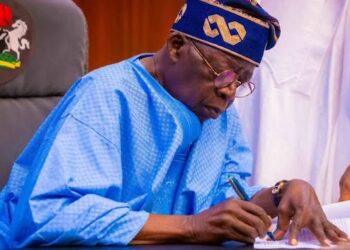 Financial experts on Monday said that single digit inflation figure could only be feasible with quick passage of 2019 budget and tight monetary policy.
Financial experts on Monday said that single digit inflation figure could only be feasible with quick passage of 2019 budget and tight monetary policy.
They stated this in interviews with the News Agency of Nigeria (NAN) in Lagos while reacting to January inflation data released by the National Bureau of Statistics (NBS) on Feb. 15.
NAN reports that Nigeria’s annual inflation rate fell to 11.37 per cent in January, down from the seven-month high it reached in December.
The data from NBS showed an improvement from the 11.44 per cent posted in December.
The price index peaked at 18.7 per cent in January 2018 and has been in double digits for three years.
They said that the country would witness further drop in inflation rate if budget was passed on time as well as implementation.
Prof. Sheriffdeen Tella, Department of Economics, Olabisi Onabanjo University, Ago-Iwoye, Ogun, told NAN that single digit inflation rate could be achieved with quick passage of the budget in the first quarter or early second quarter.
Tella said that the country would expect further drop in inflation “if budgets are passed in time and implementation starts in the first quarter or early in the second quarter”.
He added that inflation figure could also drop to single digit if the Central Bank of Nigeria (CBN) continued to maintain tight monetary policy.
Tella, however, enjoined the apex bank to continue to promote production through funding of appropriate specialised banks to stimulate economic activities.
He said that fall in inflation rate during the period was expected due to improvement in domestic production, particularly with respect to agriculture.
“Part of what has been fuelling inflation in the country was imported high prices from countries we import goods from, apart from depreciating exchange rate.
“So, improvement in domestic production or reduction in import of finished goods over the last few months caused prices to stabilise and start declining,” Tella said.
Mr Sola Oni, a chartered stockbroker and Chief Executive Officer, Sofunix Investment and Communications, said that the recent drop in the nation’s inflation rate to 11.3 per cent was due to decrease in political spending.
“The recent 0.007 drop in Nigeria’s inflation rate to 11.3 per cent in January as against 11.44 per cent in December cannot be isolated from decrease in political spending and other forms of economic activities,” Oni said.
He said that the apex bank needed to stimulate demand and boost purchasing power to achieve single digit inflation rate.
“A drop in inflation rate from economic perspective carries along some benefits such as increased competitiveness of the country’s products and services, encouragement of investment and better returns for savers, among others,” Oni said.
He noted that if reduction in inflation rate was mainly due to reduced demand, it might portend danger to economic growth and development as it was capable of discouraging investment.











